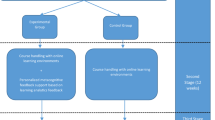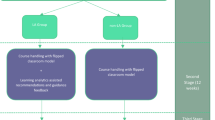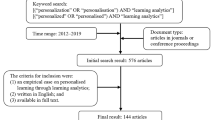Abstract
There is a growing interest in the use of learning analytics in higher education institutions. Learning analytics also appear to have the potential to be used to provide personalized feedback and support in online learning. However, when the literature is examined, the use of learning analytics for this purpose appears as a gap to be investigated. This research aims to examine the opinions of pre-service teachers about the personalized recommendation and guidance feedback based on learning analytics. The research was carried out on 40 pre-service teachers in the Computer I course, which was conducted according to the flipped learning model for 12 weeks. Throughout the research process, personalized feedback based on learning analytics was provided by researcher (the researcher is also the teacher of the Computer I course) to pre-service teachers at the end of each week. Accordingly, the students’ weekly learning management system (LMS) obtained learning analytics results from the log data related to their usage behavior. Then, the researcher prepared personalized recommendation and guidance messages based on learning analytics results. Learning analytics results and related recommendations and guidance messages were sent via LMS (from the messaging tool) as feedback. This process was done for each pre-service teacher by the researcher every week during the research process. The data of the research were obtained with a semi-structured opinion form and content analysis was made in the analysis of the data. As a result of the research, beneficial aspects and limitations of personalized recommendation and guidance feedback based on learning analytics from the perspective of pre-service teachers were revealed. In line with the results obtained from the research, various suggestions were made for the design and use of feedback messages based on learning analytics.

Similar content being viewed by others
References
Archer, E., & Prinsloo, P. (2019). Speaking the unspoken in learning analytics: Troubling the defaults. Assessment & Evaluation in Higher Education. https://doi.org/10.1080/02602938.2019.1694863.
Baker, L., & Brown, A. L. (1984). Metacognitive skills and reading. In P. D. Pearson, R. Barr, M. L. Kamil, & P. Mosenthal (Eds.), Handbook of reading research (pp. 353–394). New York: Longman.
Brown, A. L. (1987). Metacognition, executive control, self-regulation, and other more mysterious mechanisms. In F. E. Weinert & R. H. Kluwe (Eds.), Metacognition, motivation, and understanding (pp. 65–116). Hillsdale, New Jersey: Lawrence Erlbaum Associates.
Beattie, S., Woodley, C., & Souter, K. (2014). Creepy analytics and learner data rights. In Proceedings of the rhetoric and reality: Critical perspectives on educational technology-conference (Dunedin).
Bodily, R., & Verbert, K. (2017). Review of research on student-facing learning analytics dashboards and educational recommender systems. IEEE Transactions on Learning Technologies, 10(4), 405–418.
Bodily, R., Ikahihifo, T. K., Mackley, B., & Graham, C. R. (2018). The design, development, and implementation of student-facing learning analytics dashboards. Journal of Computing in Higher Education, 30(3), 572–598.
Broughan, C., & Prinsloo, P. (2019). (Re) centring students in learning analytics: in conversation with Paulo Freire. Assessment & Evaluation in Higher Education. https://doi.org/10.1080/02602938.2019.1679716.
Corrin, L., & De Barba, P. (2015). How do students interpret feedback delivered via dashboards? In Proceedings of the fifth international conference on learning analytics and knowledge (pp. 430–431).
Dawson, S., Gašević, D., Siemens, G., & Joksimovic, S. (2014). Current state and future trends: A citation network analysis of the learning analytics field. In Proceedings of the fourth international conference on learning analytics and knowledge (pp. 231–240). ACM.
Drachsler, H., & Greller, W. (2012). The pulse of learning analytics understandings and expectations from the stakeholders. In Proceedings of the 2nd international conference on learning analytics and knowledge (pp. 120–129).
Dyckhoff, A. L., Zielke, D., Bültmann, M., Chatti, M. A., & Schroeder, U. (2012). Design and implementation of a learning analytics toolkit for teachers. Journal of Educational Technology & Society, 15(3), 58–76.
Er, E., Gómez-Sánchez, E., Dimitriadis, Y., Bote-Lorenzo, M. L., Asensio-Pérez, J. I., & Álvarez-Álvarez, S. (2019). Aligning learning design and learning analytics through instructor involvement: a MOOC case study. Interactive Learning Environments, 27(5–6), 685–698.
Gall, D. M., Gall, P. J., & Borg, W. R. (2007). Educational research: An introduction. Boston, MA: Pearson.
Gašević, D., Dawson, S., Rogers, T., & Gasevic, D. (2016). Learning analytics should not promote one size fits all: The effects of instructional conditions in predicting academic success. The Internet and Higher Education, 28, 68–84.
Govaerts, S., Verbert, K., Duval, E., & Pardo, A. (2012). The student activity meter for awareness and self-reflection. In CHI’12 extended abstracts on human factors in computing systems (pp. 869–884). ACM.
Greller, W., & Drachsler, H. (2012). Translating learning into numbers: A generic framework for learning analytics. Journal of Educational Technology & Society, 15(3), 42–57.
Herodotou, C., Rienties, B., Boroowa, A., Zdrahal, Z., & Hlosta, M. (2019). A large-scale implementation of predictive learning analytics in higher education: the teachers’ role and perspective. Educational Technology Research and Development. https://doi.org/10.1007/s11423-019-09685-0.
Howell, J. A., Roberts, L. D., Seaman, K., & Gibson, D. C. (2018). Are we on our way to becoming a “helicopter university”? Academics’ views on learning analytics. Technology, Knowledge and Learning, 23(1), 1–20.
Ibañez, P., Villalonga, C., & Nuere, L. (2019). Exploring student activity with learning analytics in the digital environments of the Nebrija University. Technology, Knowledge and Learning. https://doi.org/10.1007/s10758-019-09419-4.
Ifenthaler, D., & Widanapathirana, C. (2014). Development and validation of a learning analytics framework: Two case studies using support vector machines. Technology, Knowledge and Learning, 19(1–2), 221–240.
Ifenthaler, D., & Yau, J. Y. K. (2020). Utilising learning analytics to support study success in higher education: a systematic review. Educational Technology Research and Development. https://doi.org/10.1007/s11423-020-09788-z.
Jivet, I., Scheffel, M., Drachsler, H., & Specht, M. (2017). Awareness is not enough: Pitfalls of learning analytics dashboards in the educational practice. In European conference on technology enhanced learning (pp. 82–96). Springer, Cham.
Jivet, I., Scheffel, M., Specht, M., & Drachsler, H. (2018). License to evaluate: Preparing learning analytics dashboards for educational practice. In Proceedings of the 8th international conference on learning analytics and knowledge (pp. 31–40). ACM.
Karaoglan Yilmaz, F. G., Olpak, Y. Z., & Yilmaz, R. (2018). The effect of the metacognitive support via pedagogical agent on self-regulation skills. Journal of Educational Computing Research, 56(2), 159–180.
Karaoglan Yilmaz, F. G., & Yilmaz, R. (2019). Impact of pedagogic agent-mediated metacognitive support towards increasing task and group awareness in CSCL. Computers & Education, 134, 1–14.
Karaoglan Yilmaz, F. G. (2020). Modeling different variables in flipped classrooms supported with learning analytics feedback. Journal of Information and Communication Technologies, 2(1), 1–16.
Kerly, A., Ellis, R., & Bull, S. (2007). CALMsystem: A conversational agent for learner modelling. In International conference on innovative techniques and applications of artificial intelligence (pp. 89–102). Springer, London.
Kim, D., Lee, I. H., & Park, J. H. (2019). Latent class analysis of non-formal learners’ self-directed learning patterns in open educational resource repositories. British Journal of Educational Technology, 50(6), 3420–3436.
Klein, C., Lester, J., Rangwala, H., & Johri, A. (2019). Technological barriers and incentives to learning analytics adoption in higher education: insights from users. Journal of Computing in Higher Education, 31(3), 604–625.
Kloos, C. D., Pardo, A., Muñoz-Merino, P. J., Gutiérrez, I., & Leony, D. (2013). Learning analytics@ UC3M. In 2013 IEEE global engineering education conference (EDUCON) (pp. 1232–1238). IEEE.
Knox, D. (2010). Spies in the house of learning: A typology of surveillance in online learning environments. Paper presented to EDGE 2010—E-learning: The horizon and beyond conference. Newfoundland, Canada, October.
Kokoç, M. (2016). The relation of interaction with learning dashboards as a learning analytics tool in e-learning environment between learning outcomes. Doctoral Dissertation, Hacettepe University, Ankara, Turkey.
Kosba, E., Dimitrova, V., & Boyle, R. (2005). Using student and group models to support teachers in web-based distance education. In International conference on user modeling (pp. 124–133). Springer, Berlin, Heidelberg.
Kruse, A. N. N. A., & Pongsajapan, R. (2012). Student-centered learning analytics. CNDLS thought papers (pp. 1–9).
Kujawa, S., & Huske, L. (1995). The strategic teaching and reading project guidebook. Oak Brook, IL: North Central Regional Educational Laboratory.
Lim, L. A., Gentili, S., Pardo, A., Kovanović, V., Whitelock-Wainwright, A., Gašević, D., et al. (2019). What changes, and for whom? A study of the impact of learning analytics-based process feedback in a large course. Learning and Instruction. https://doi.org/10.1016/j.learninstruc.2019.04.003.
Lu, O. H., Huang, J. C., Huang, A. Y., & Yang, S. J. (2017). Applying learning analytics for improving students engagement and learning outcomes in an MOOCs enabled collaborative programming course. Interactive Learning Environments, 25(2), 220–234.
Pardo, A., Jovanovic, J., Dawson, S., Gašević, D., & Mirriahi, N. (2019). Using learning analytics to scale the provision of personalised feedback. British Journal of Educational Technology, 50(1), 128–138.
Park, Y., & Jo, I. H. (2015). Development of the learning analytics dashboard to support students’ learning performance. Journal of Universal Computer Science, 21(1), 110–133.
Prinsloo, P., Slade, S., & Galpin, F. (2012). Learning analytics: challenges, paradoxes and opportunities for mega open distance learning institutions. In Proceedings of the 2nd ınternational conference on learning analytics and knowledge (pp. 130–133).
Prinsloo, P., & Slade, S. (2014). Educational triage in open distance learning: Walking a moral tightrope. International Review of Research in Open and Distributed Learning, 15(4), 306–331.
Prinsloo, P. (2015). Algorithmic decision-making in higher education: There be dragons there… https://opendistanceteachingandlearning.wordpress.com/2015/12/14/algorithmic-decision-making-in-higher-education-there-be-dragons-there/. Accessed April 26, 2020.
Prinsloo, P., Archer, E., Barnes, G., Chetty, Y., & Van Zyl, D. (2015). Big (ger) data as better data in open distance learning. International Review of Research in Open and Distributed Learning, 16(1), 284–306.
Prinsloo, P. (2016). Failing our students: Not noticing the traces they leave behind. https://opendistanceteachingandlearning.wordpress.com/. Accessed April 26, 2020.
Prinsloo, P., & Slade, S. (2016). Student vulnerability, agency, and learning analytics: An exploration. Journal of Learning Analytics, 3(1), 159–182.
Prinsloo, P. (2017). Fleeing from Frankenstein’s monster and meeting Kafka on the way: Algorithmic decision-making in higher education. E-Learning and Digital Media, 14(3), 138–163.
Prinsloo, P., & Slade, S. (2017). An elephant in the learning analytics room: The obligation to act. In Proceedings of the seventh international learning analytics & knowledge conference (pp. 46–55).
Prinsloo, P. (2019). Tracking (un) belonging: At the intersections of human-algorithmic student support. Retrieved from http://dspace.col.org/handle/11599/3373.
Roberts, L. D., Howell, J. A., Seaman, K., & Gibson, D. C. (2016a). Student attitudes toward learning analytics in higher education: The fitbit version of the learning world. Frontiers in Psychology, 7, 1959.
Roberts, L., Chang, V., & Gibson, D. (2016b). Ethical considerations in adopting a university- and system-wide approach to data and learning analytics. In B. Kei Daniel (Ed.), Big data and learning analytics in higher education (pp. 89–108). Cham: Springer.
Schumacher, C., & Ifenthaler, D. (2018). Features students really expect from learning analytics. Computers in Human Behavior, 78, 397–407.
Sedrakyan, G., Malmberg, J., Verbert, K., Järvelä, S., & Kirschner, P. A. (2018). Linking learning behavior analytics and learning science concepts: Designing a learning analytics dashboard for feedback to support learning regulation. Computers in Human Behavior, 107, 105512.
Seufert, S., Meier, C., Soellner, M., & Rietsche, R. (2019). A pedagogical perspective on big data and learning analytics: A conceptual model for digital learning support. Technology, Knowledge and Learning, 24(4), 599–619.
Siemens, G., & Gasevic, D. (2012). Guest editorial-learning and knowledge analytics. Journal of Educational Technology & Society, 15(3), 1–2.
Slade, S., & Prinsloo, P. (2013). Learning analytics: Ethical issues and dilemmas. American Behavioral Scientist, 57(10), 1510–1529.
Tempelaar, D. T., Rienties, B., & Giesbers, B. (2015). In search for the most informative data for feedback generation: Learning analytics in a data-rich context. Computers in Human Behavior, 47, 157–167.
Tlili, A., Denden, M., Essalmi, F., Jemni, M., Chang, M., Kinshuk, et al. (2019). Automatic modeling learner’s personality using learning analytics approach in an intelligent Moodle learning platform. Interactive Learning Environments. https://doi.org/10.1080/10494820.2019.1636084.
Wang, M., Yuan, B., Kirschner, P. A., Kushniruk, A. W., & Peng, J. (2018). Reflective learning with complex problems in a visualization-based learning environment with expert support. Computers in Human Behavior, 87, 406–415.
van Alten, D. C., Phielix, C., Janssen, J., & Kester, L. (2019). Effects of flipping the classroom on learning outcomes and satisfaction: A meta-analysis. Educational Research Review, 28, 100281. https://doi.org/10.1016/j.edurev.2019.05.003.
Vanslambrouck, S., Zhu, C., Pynoo, B., Lombaerts, K., Tondeur, J., & Scherer, R. (2019). A latent profile analysis of adult students’ online self-regulation in blended learning environments. Computers in Human Behavior, 99, 126–136.
Yilmaz, R., & Keser, H. (2017). The impact of interactive environment and metacognitive support on academic achievement and transactional distance in online learning. Journal of Educational Computing Research, 55(1), 95–122.
Yilmaz, R. (2020). Enhancing community of inquiry and reflective thinking skills of undergraduates through using learning analytics-based process feedback. Journal of Computer Assisted Learning. https://doi.org/10.1111/jcal.12449.
Yin, R. K. (2013). Case study research: Design and methods. New York: Sage Publications.
Zhu, M., Bonk, C. J., & Doo, M. Y. (2020). Self-directed learning in MOOCs: Exploring the relationships among motivation, self-monitoring, and self-management. Educational Technology Research and Development. https://doi.org/10.1007/s11423-020-09747-8.
Funding
The authors declare that they have no funding of this study.
Author information
Authors and Affiliations
Corresponding author
Ethics declarations
Conflict of interest
The authors declare that they have no conflict of interest.
Additional information
Publisher's Note
Springer Nature remains neutral with regard to jurisdictional claims in published maps and institutional affiliations.
Rights and permissions
About this article
Cite this article
Karaoglan Yilmaz, F.G., Yilmaz, R. Student Opinions About Personalized Recommendation and Feedback Based on Learning Analytics. Tech Know Learn 25, 753–768 (2020). https://doi.org/10.1007/s10758-020-09460-8
Published:
Issue Date:
DOI: https://doi.org/10.1007/s10758-020-09460-8




